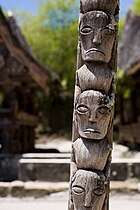Analogy (human sciences)


An analogy ( Greek ἀναλογία, analogy , " proportionality , correspondence, proportionality") generally indicated matching features of various similar but not related phenomena, the origin of a similar adjustment processes can be recycled in similar environmental conditions.
It is derived from the analogy concept of biology , which is sometimes used in this modified form in various human sciences (history, social, cultural studies, ethnology, archeology) in order to make the difference to homologous developments clear.
Analogous characteristics of different human cultures are for example:
- the emergence of the soil structure
- the invention of writing systems
- Totemism (mythical-family connection to certain natural phenomena)
All these things arose several times in human development in isolated regions, independently of one another.
In contrast to biology, the differentiation between analogies and homologies is much more difficult in the human sciences, since cultural change takes place much faster than natural evolution and does not manifest itself in genes, but in very different "modes of expression", the authenticity of which is often unclear. A striking example of this is provided by the different approaches to shamanism : While the followers of esoteric core shamanism according to Michael Harner see it as a global, human universalism - that is, assume a homologous origin - the ethnologist Klaus E. Müller sees shamanism as a kind of " magical science ”, which developed analogously outside of Asia.
literature
- Werner J. Patzelt: Evolutionary Institutionalism: Theory and exemplary studies on evolution, institutionality and historicity. Ergon Verlag, Würzburg 2007, ISBN 978-3-89913-554-1 .
- Alexander Gramsch: Comparing as an archaeological method: Analogies in the archeologies - with contributions from a conference of the Working Group Theory (T-AG) and an annotated bibliography. Archaeopress, Oxford 2000, ISBN 978-1-8417-1037-2 , pp. 12, 125-126.
Individual evidence
- ↑ Klaus E. Müller: Shamanism. Healers, spirits, rituals. 4th edition, Beck, Munich 2010 (original edition 1997), ISBN 978-3-406-41872-3 , pp. 117-119.